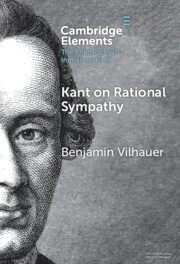10 results
Chapter 5 - The ‘High Victorian’
-
-
- Book:
- Nineteenth-Century Literature in Transition: The 1870s
- Published online:
- 30 January 2025
- Print publication:
- 06 February 2025, pp 107-126
-
- Chapter
- Export citation

Kant on Rational Sympathy
-
- Published online:
- 02 December 2024
- Print publication:
- 02 January 2025
-
- Element
- Export citation
Chapter 5 - ‘The Holiest Man Ever Born’: Sages, Theioi Andres, and the Shaping of Late Greek Prophecy
- from Part II - Status, Role, and Functions of Human Intermediaries
-
-
- Book:
- Divination and Revelation in Later Antiquity
- Published online:
- 19 October 2023
- Print publication:
- 02 November 2023, pp 99-119
-
- Chapter
- Export citation

Qumran Wisdom and the New Testament
- Exploring Early Jewish and Christian Textual Cultures
-
- Published online:
- 22 December 2022
- Print publication:
- 22 December 2022
Sages, Sympathy, and Suffering in Kant’s Theory of Friendship
-
- Journal:
- Canadian Journal of Philosophy / Volume 51 / Issue 6 / August 2021
- Published online by Cambridge University Press:
- 10 March 2022, pp. 452-467
-
- Article
- Export citation
2 - Pandemics Are Not Random ‘Black Swans’
- from Part I - COVID-19 Was Always a Matter of ‘When’ Not ‘If’
-
- Book:
- After the Virus
- Published online:
- 20 August 2021
- Print publication:
- 23 September 2021, pp 44-66
-
- Chapter
- Export citation
Can we agree on the quality of clinical supervision? Inter-rater reliability of the Short–SAGE (Supervision: Adherence and Guidance Evaluation) scale
-
- Journal:
- The Cognitive Behaviour Therapist / Volume 13 / 2020
- Published online by Cambridge University Press:
- 17 December 2020, e56
-
- Article
-
- You have access
- Open access
- HTML
- Export citation
MOZI AND THE GHOSTS: THE CONCEPT OF MING 明 IN MOZI’S “MING GUI”《明鬼》
-
- Journal:
- Early China / Volume 40 / 2017
- Published online by Cambridge University Press:
- 23 January 2017, pp. 89-123
- Print publication:
- 2017
-
- Article
-
- You have access
- HTML
- Export citation
Transcriptome analysis of Schistosoma mansoni larval development using serial analysis of gene expression (SAGE)
-
- Journal:
- Parasitology / Volume 136 / Issue 5 / April 2009
- Published online by Cambridge University Press:
- 05 March 2009, pp. 469-485
-
- Article
- Export citation
An evaluation of serial analysis of gene expression (SAGE) in the parasitic nematode, Haemonchus contortus
-
- Journal:
- Parasitology / Volume 130 / Issue 5 / May 2005
- Published online by Cambridge University Press:
- 06 January 2005, pp. 553-559
-
- Article
- Export citation

